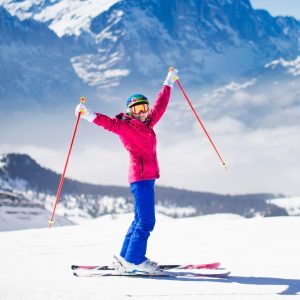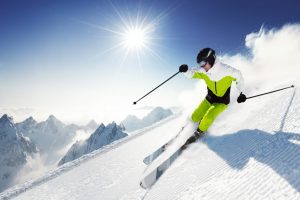Injury-Free Skiing in 2019
The importance of Plyometrics in any workout
January 21, 2019BAREFOOT RUNNING – GOOD OR BAD?
February 18, 2019If you are embarking on a skiing holiday this year, here are some useful tips to keep you safe on the slopes:
Pre-Ski Fitness Tips:
- Don’t just sit there – Exercising through squats, sit ups and cycling is also good to tease the right muscles.
- It’s a balancing act – Balance is the single most important factor in skiing. Use a wobble board to improve balance and build up ankle muscles. For a thorough ankle work-out, rocking heel to toe is good for snowboarders and left to right is best for skiers.
- Jump around – Use a mini trampoline to work all those ‘skiing’ muscles.
- Roll with it – Roller blading is perfect practice and will help you develop a good ski posture, so you look like a pro on the slopes.
Check it out – Most skiers find turning one way easier than the other. Poor technique might not be the problem, so talk to a chiropractor for advice.
- Hot and Cold – Warm up before strenuous skiing. Start off gently rather than
heading first for the black runs and round the day off with a stretch. - Take plenty of breaks – Overexertion will ruin your holiday – moderate the length of skiing time and listen to your body. Pain is a warning sign, don’t ignore it.
- Liquid lunch – Drink plenty of water and isotonic drinks to avoid dehydration and stay clear of alcohol, tea and coffee.
- Wrap up – Make sure clothing is warm and adequate for the cold weather and don’t forget hat and gloves.
- Put the boot in – No matter how many lessons, skiers won’t improve without the right boots and this is where most skiers put their first foot wrong. Skiers often choose on comfort alone – don’t make this mistake. Get a moulded footbed from the ski shop first as this improves fit, comfort and ski control. Opt for a shop with a wide range of boots so you are spoilt for choice.
- What a bind – If you are prone to going ‘knock-kneed’ when you ski, look out for lateral alignment. Wedges expertly placed under the binding can make a huge difference.
- Carry on – Always be careful when carrying skis/boards. Leave them standing upright so you don’t have to bend to pick them up. Carry them over your shoulder, swapping shoulders regularly.
- Ice is nice – With an acute injury, use ice rather than heat.

- Tread carefully – A great deal of people are injured by slipping on ice at the ski resort, not just on the slopes. Wear shoes with a deep threaded sole and use strap-on studs for ski boots to help keep you upright.
- Beware Day 3 – after a few days skiing, you’ll be physically tired but high on confidence. For this reason, Day 3 is the most common day for injuries to occur. You have been warned.
No matter how prepared and cautious you may be, we are all vulnerable to injury when speeding down the mountain at 40 miles per hour! Prevention is always better than cure so visit your manual therapist in advance and make sure your body is in good working order and enjoy injury-free skiing in 2019.
James B.




